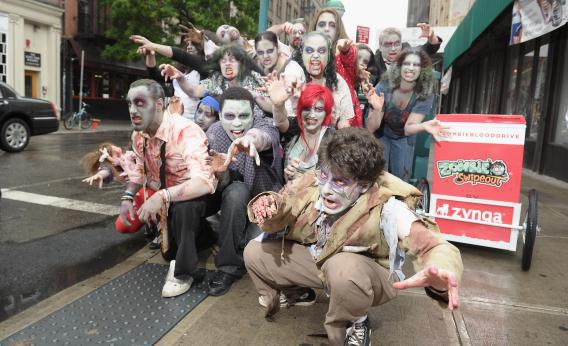In a surprising development, the company that made FarmVille, Words With Friends, and a bunch of other Facebook games you don’t play anymore announced today that it is sparing 82 percent of its workforce—some 2,900 employees, by my count—and leaving open its San Francisco headquarters. The moves mean that Zynga will continue to spend hundreds of millions of dollars a year senselessly churning out titles like FarmVille Mobile, ChefVille, and CityVille Hometown until further notice.
Or, if you prefer the conventional spin, Zynga is laying off 18 percent of its workforce and reportedly shuttering offices in New York, Dallas, and Los Angeles. The moves will save the company an estimated $70 to $80 million in pre-tax expenses as it tries to refashion itself from a desktop-gaming company into a mobile-gaming company. Among the casualties is OMGPOP, the startup that Zynga bought for $180 million just last year because it made a hit game called Draw Something. Somehow, it seems Draw Something 2 failed to ignite the marketplace.
There isn’t a whole lot to say about the rise and fall of Zynga that hasn’t already been said. I compared it to Pet Rocks when its stock tanked last fall; my colleague Farhad Manjoo dubbed it “this generation’s Pets.com.”
The real news here is not that the company is dying, but that its zombie is still lurching on, gamely attempting to adapt its business model to a medium for which it wasn’t built. AllThingsD’s Kara Swisher called the latest layoffs “right-sizing,” but it seems to me that if there is a right size for Zynga at this point, it’s something much, much closer to zero. Zynga was optimized to rule one very specific niche—the desktop Facebook game—at a particular moment in time. When the ground shifted, its foundations crumbled.
Maybe the lesson is that companies built to capitalize on the fad of the moment should be constructed from the beginning to be small and light and temporary, like a forward operating base. That way, when the moment passes, they can fold up neatly and everyone can move on, rather than leaving wreckage strewn across five cities, two countries, and who knows how many different mobile platforms.
Then again, maybe that’s sort of what happened. After all, Zynga’s biggest investors cashed out long ago. And apparently its laid-off New York employees celebrated their firings with a boozy bash. The only people hurting today are the investors who failed to see the writing on the wall. Perhaps next time they will.
